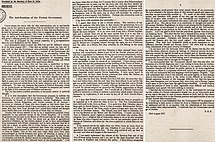
Back معاداة الصهيونية Arabic Антиционизъм Bulgarian Antisionisme Catalan Antisiyonismo CEB دژە زایۆنیزم CKB Antisionismus Czech Antizionisme Danish Antizionismus German Kontraŭcionismo Esperanto Antisionismo Spanish
Anti-Zionism is opposition to Zionism. Although anti-Zionism is a heterogeneous phenomenon, all its proponents agree that the creation of the modern State of Israel, and the movement to create a sovereign Jewish state in the region of Palestine—a region partly coinciding with the biblical Land of Israel—was flawed or unjust in some way.[4]
Until World War II, anti-Zionism was widespread among Jews for varying reasons. Orthodox Jews opposed Zionism on religious grounds, as preempting the Messiah,[a] while many secular Jewish anti-Zionists identified more with ideals of the Enlightenment and saw Zionism as a reactionary ideology. Opposition to Zionism in the Jewish diaspora was surmounted only from the 1930s onward, as conditions for Jews deteriorated radically in Europe and, with the Second World War, the sheer scale of the Holocaust was felt.[5] Thereafter, Jewish anti-Zionist groups generally either disintegrated or transformed into pro-Zionist organizations, though many small groups, and bodies like the American Council for Judaism, conserved an earlier Reform tradition of rejection of Zionism.[6] Non-Jewish anti-Zionism likewise spanned communal and religious groups, with the Arab populace of Palestine largely opposed to what they considered the colonial dispossession of their homeland. Opposition to Zionism was, and continues to be, widespread in the Arab world, especially among Palestinians.
Many anti-Zionists seek to replace Israel and its occupied territories with a single state that would give Jews and Palestinians equal rights.[7] Anti-Zionists have argued that a binational state would still realize Jewish self-determination,[8] as self-determination need not imply a separate state.[9] Some supporters of Zionism highlight that some antisemites hold anti-Zionist views. The relationship between Zionism, anti-Zionism and antisemitism is debated, with some academics and organizations that study antisemitism taking the view that anti-Zionism is inherently antisemitic or new antisemitism, while others reject any such linkage as unfounded and a form of weaponization of antisemitism in order to stifle criticism of Israel and its policies, including its occupation of the West Bank and blockade of the Gaza Strip.
- ^ Schneer 2010, p. 193.
- ^ Klug 2004.
- ^ Caplan 2015, p. 54.
- ^ Mor, Shany. "On Three Anti-Zionisms." Israel Studies, vol. 24, no. 2, summer 2019, pp. 206+. Gale In Context: World History. Accessed 2 Nov. 2022.
- ^ Kolsky 2009, p. 333.
- ^ Halperin 1961, pp. 451–452.
- ^ "Congress Is Absolutely Wrong to Equate Anti-Zionism With Antisemitism". jacobin.com. Retrieved 7 October 2024.
- ^ Cite error: The named reference
:1was invoked but never defined (see the help page). - ^ "There Is No Right to a State". Jewish Currents. Retrieved 7 October 2024.
Cite error: There are <ref group=lower-alpha> tags or {{efn}} templates on this page, but the references will not show without a {{reflist|group=lower-alpha}} template or {{notelist}} template (see the help page).

